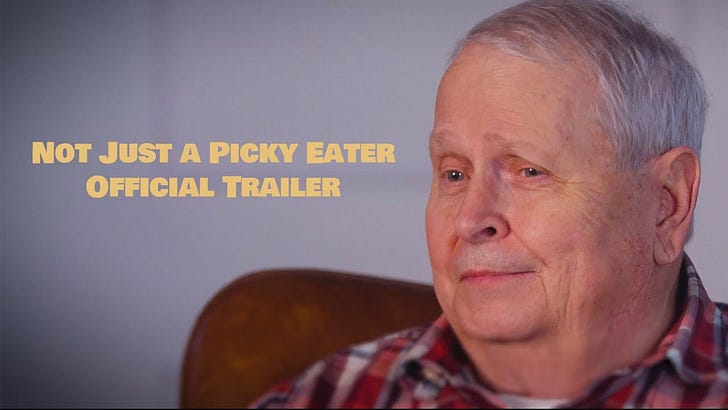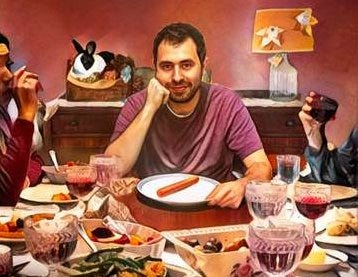Indy Film Fest: Not Just a Picky Eater
Hoosier filmmaker Eric Pascarelli explores his own disordered eating habits and discovers he's actually part of a hidden community in this very palatable documentary.
For Indy Film Fest schedule and tickets, please click here.
I love the tagline on the poster for “Not Just a Picky Eater,” an entirely palatable documentary about people with ARFID: “Eating alone together.” In it, Hoosier filmmaker Eric Pascarelli turns the camera on himself and finds out he’s actually part of a widespread but well-hidden community.
ARFID stands for avoidant restrictive food intake disorder, a condition that’s got a much lower level of awareness than things like anorexia or bulimia. It’s an eating disorder that probably affects millions of Americans (and countless more abroad) who have spent their lives being labeled, criticized and dismissed as “picky eaters.”
Everybody’s picky about some kinds of foods, and kids in particular are often squeamish, even about entire sections of the fabled nutrition pyramid. I grew up a prototypical veggie-hater, and while my repertoire has expanded considerably there are still many things green I can’t abide. (I tried the “new” brussels sprouts. Still vile.) We struggle to get my older son to ingest protein.
Pascarelli, though, found himself in a seemingly solitary extreme. For him and people like him, they regard most foods as revolting — to the point of having a panic attack at just the thought of eating them. Many of them are things they’ve never even tried. They find themselves restricting themselves to just a handful of foods they can eat.
In his case, it was just hot dogs, hamburgers or cheese pizza. Imagine living a life constantly rotating the same handful of meal choices around again and again.
In interviewing others with ARFID as well as doctors, scientists and other experts, Pascarelli discovers that there are many just like him struggling to fit in. Dining out, especially socially with others, or just a work meal wit colleagues can become an anxiety-inducing event than leaves the person staying up all night beforehand worrying.
One person with ARFID, Bob Krauss, spent 13 years in the Navy hiding his need to eat only certain foods, particularly donuts. He eventually left the service when it was discovered he was only eating breakfast every day. After years of researching medical texts and asking questions, Krauss founded the website pickingeatingadults.com, where Pascarelli and many others discovered an entire spectrum of people just like themselves.
Most of them had thought they were literally the only person on the planet to whom obtaining sustenance was a traumatic rather than fulfilling experience.
(Krauss admits the name of his site is somewhat misleading, but people attempting to self-diagnose what’s troubling them often use this kind of language when they’re starting out.)
The exact source of why some people develop ARFID isn’t really known, though like other eating disorders it may be tied to trauma experienced in childhood or even infancy. Certain textures, colors or smells set a person off without the food ever even passing their lips. There seems to be a uniting preference for carbs over plants and meat. It can also involve the preparation and serving of food, such as Pascarelli’s avoidance of using a knife and fork together, though single utensils don’t bother him.
The testimonials of other people with ARFID are sometimes humorous, sometimes tragic, but always emotional on some level. They’re just regular people trying to adapt to this one singular aspect of their lives they can’t control. It’s like trying to explain to someone without acrophobia why even the mildest heights can send someone (me included) into a barely functioning state of shock.
Marla Lopez is known as “the french fry lady” because that’s most of her diet. Another woman admits she eats cheese pizza virtually every day. For others it’s grilled cheese sandwiches, mashed potatoes or other “safe” foods that comprimse almost their entire diet.
Another Hoosier, Ariel, originally from Mexico, gets teased by her relatives for her seemingly “gringa” tastes that eschew anything with traditional Latin spiciness. A married Indianapolis couple, Ashley and Kate, talk about what it’s like to be in a relationship with a person with ARFID, where supportive behavior like trading plates at group dinners so it looks like the other person ate their salad is practically a love letter.
We also talk with Dr. Jennifer Thomas, a food researcher at Harvard University, and Chrissy Miller, an Indianapolis food therapist, who go in depth into how this disorder presents itself and what people with ARFID can do. It seems to be organized around three principles: sensory issues, fear-based issues and just a general lack of interest in food. One or more can influence each person with the disorder.
They’re realistic about the road ahead: people with ARFID aren’t going to suddenly become gourmands trotting the globe like Anthony Bourdain trying grilled octopous and toasted insects. But with self-training and therapy, they can reasonably expand their list of safe foods so they can have a sustaining diet and increase their social access to dining.
For Pascarelli, the journey of embracing his eating disorder (and possibly making this film) have helped him expand his horizons, such as incorporating chocolate milk smoothies into his regimen.
One interesting technique the filmmaker uses to emphasize himself as one of the subjects is having himself “interviewed” by a third party, a (possibly fictional) podcaster from Holly’s Healthy Helpings, which acts as a sort of framing device for the documentary. Rather than just narrate, this way Pascarelli can act as the film’s centering guide without establishing himself as the ‘authority figure’ who knows everything, rather than a guy with a lot of questions.
Here’s something I’ve learned in life: everybody’s weird in some way. Some of these are quite apparent to others, while others are easily hidden. Suffering in silence about the ways in which we’re different only reinforces our alienation. When we’re brave enough to open up and talk about our weirdness and accept it as part of ourselves, we become less lonely.
“Not Just a Picky Eater” is a not just a terrific, empathetic documentary that explores a community of people who have felt all alone — it’s cinematic therapy. Dig in.





